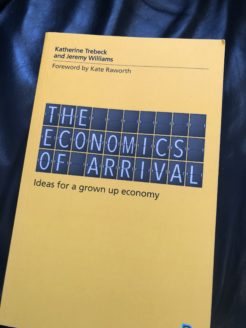I have a vested interest in reading ‘The Economics of Arrival’ by Kathleen Trebeck and Jeremy Williams as Jeremy goes to my church. We sit together on a committee which is looking to address ways that our church can become an Eco church. Have a look at https://ecochurch.arocha.org.uk/ if you would like a structure towards getting your church to become more sustainable.
Jeremy Williams:
I’m getting to know Jeremy and I am finding him to be a man of principle. He is demonstrating his passion for sustainable change through his work, his spare time and his home life. I have much to learn.
The Economics of Sustainability
As a financial adviser, economics is a subject which interests me. Whilst my collection of ‘green books’ grows, the one which resonated the most was ‘Doughnut economics’ by Kate Raworth https://www.christianfinancialadvisors.co.uk/insights/blog/doughnut-economics/ . This argued against the obsession we have with growth, and particularly the measurement of GDP.
The Economics of Arrival builds on that. This cannot ever be called a light read, but it is a book that deserves to be read because the proposal that some countries need to stop growing and accept that they have ‘arrived’ is a big leap forward towards sustaining this earth and making it a fairer place for all inhabitants.
The book challenges the notion that increased growth leads to greater happiness and one of its strengths is that it is so well researched. The book is densely populated with quotes and references from academics. The arguments are therefor not emotional but objective. I had no idea that studies have been carried out looking at the correlation between income and wellbeing and it can now be considered fact that after a certain threshold there are diminishing returns to increase income in terms of personal wellbeing.
Explaining the Terminology
We are all grappling with new terminolgy. Explanations of ‘Failure demand’ and ‘Marketization’ give us names for behaviours that we all accept but when defined and understood would make us want to change in both ourselves and society.
This is a tall ask. For many of us, fairness and equality will mean being givers rather than receivers, so it’s an uncomfortable read too. Rome wasn’t built in a day and the more we all commit to learning about such issues the more we will slowly allow it to absorb into all areas of our lives.
Investing for impact
Perhaps one way to start is to look at where our investments are directed. Can they be used as a source for good? This is something we can all do right now. Talk to your IFA.

